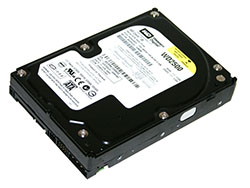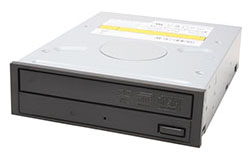Pre-AM2 Mid-Range Buyers' Guide, May 2006
by Jarred Walton on May 9, 2006 6:30 AM EST- Posted in
- Guides
Storage Recommendations
There hasn't been a lot of excitement in the area of computer storage lately - unless you follow the flame wars being waged online between the Blu-Ray and HD-DVD marketing departments? I've used quite a few hard drives over the past year, from every major manufacturer. Western Digital, Maxtor, Seagate, Hitachi, and Samsung all make reasonable hard drives, at least as far as performance is concerned. Without running benchmarks, I certainly can't tell the difference between any of the hard drives. A second area of performance is noise levels, and while most of the hard drive manufacturers are pretty close together, Maxtor drives are definitely among the loudest on the market. (A friend described them as "bongo drums" recently.) Older model drives can also be louder, so we would recommend sticking to the latest models if at all possible. Samsung and Seagate are the quietest drives, with Samsung having a slight lead, but depending on the rest of your computer it may not matter too much. Hard drive noise levels only become a factor if you have a relatively silent system. If you plan on having three or more case fans (counting the PSU), it's unlikely that you will notice hard drive noise. |
| Click to enlarge |
Hard Drive Recommendation: Western Digital SATA3.0Gbps 250GB 7200RPM 16MB Caviar SE16
Price: $95 shipped (OEM)
Since performance isn't the overriding concern, we're mostly left with looking at price perGB. It's also reasonable to state that most people don't need more than 250GB of hard drive space - and probably not even that much. The 250GB models continue to offer the best price perGB of storage, and for a couple dollars extra you can get 16MB of cache on certain models. Coming in at $.38 perGB, the Western Digital 250GB SE16 SATA2 gets our pick. I've purchased four of these drives in the last six months, and I haven't had any problems. (I haven't had problems with my Hitachi, Samsung, or Seagate drives either.) If you're looking for a bit more storage capacity, the Seagate 300GB 7200.9 and the Western Digital 320GB SE16 both have a similar cost perGB and also come with 16MB of cache. Seagate also carries a standard five-year warranty, but of course if you ever need to use the warranty you'll be really unhappy with the loss of your data. The best way to avoid data loss is to back up your hard drive, which brings us to our optical drive recommendation.
 |
| Click to enlarge |
DVDR Recommendation: NEC 3550A (OEM)
Price: $37 shipped (OEM)
With prices under $40, we once again reiterate the statement that there's no point in getting anything other than a DVD burner these days. If you've already got several DVD burners in other computers, you might want to go with a 16X DVD-ROM, but that's about the only case where we wouldn't spend the extra money. BenQ, Pioneer, LG, Plextor, and Lite On also make reasonable burners, but in terms of price/performance we would take the NEC 3550A. Plextor also has an 18X burner out, but with a price of $100 not to mention reported media incompatibilities, you should save your money for now.
| Hard Drive Alternatives | |
| Western Digital 3.0Gbps 320GB 7200RPM 16MB Caviar SE16 | 125 |
| Seagate 3.0Gbps 300GB 7200RPM 16MB Barracuda 7200.9 | 122 |










56 Comments
View All Comments
Griswold - Tuesday, May 9, 2006 - link
Shouldnt always go for the bigger number at a similar price. There are more important numbers with PSUs than the absolute wattage.KorruptioN - Tuesday, May 9, 2006 - link
Even though it's only rated at 400W overall (yes, wattage is not the best indicator of overall output), it can do 30A on the +12V output alone (360W divided by 12V), which is a good amount for a non-SLI configuration. Even two 7600GTs wouldn't be enough to push this power supply past it's limits. I think it is a good all-around choice.JarredWalton - Tuesday, May 9, 2006 - link
I've got a system very similar to this, only with a 7800 GTX, an overclocked X2 3800+, and two 250GB hard drives... all running off a Thermaltake 410W PSU. Maximum power draw hits about 315W - and that's not even counting for PSU efficiency (i.e. that's measuring at the outlet).I mentioned several alternative PSUs that people can consider. Why do I like modular units? Sleeved cables, reduced cable clutter, and for an extra $15 I'm willing to go that route. Opinions vary, naturally - this guide is basically my opinion, after all.
IntelUser2000 - Tuesday, May 9, 2006 - link
Sure about that. Only 35%?? I think 35% will be the absolute minimum over Netburst in Netburst optimized apps.
peternelson - Tuesday, May 9, 2006 - link
Difficult to make comparisons of "same price" netburst cpu, because Intel roadmap will make FURTHER REDUCTIONS in price of 930,940,950 after Core Duo 2 launches through November.950 probably isn't going to compete with the new chips on total performance, but may not be that bad in bang for buck in comparison.
JarredWalton - Tuesday, May 9, 2006 - link
Rough estimate, and it could be more or less depending on benchmarks. Core Duo T2300 costs a bit more than Pentium D 930. Looking at *stock* performance, AutoGK encoding for example should be around 55 FPS for the 930, while the T2400 get 44 FPS. Even with a 25% boost in performance, the Core Duo 2 $210 CPU is probably going to about equal PD 930.The flipped side is that some benches (games especially) will be more than 35%. PD 920 at 2.8 GHz maxes out at 63 FPS in BF2, roughly. (Doesn't matter about resolution - 800x600 still gets ~63 FPS.) Gary got 83 FPS with T2400 at stock, and 112 at 2.8 GHz. If CD2 gives another 25%... we're looking at maybe 104 FPS for a 1.83 GHz Core Duo 2. Assuming such a chip costs $210, it's got a 65% performance advantage. :)
Anyway, I'll tweak the text slightly.